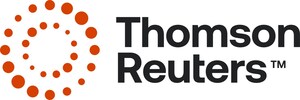Thomson Reuters Helps Pharmaceutical Executives Identify Drugs with Repositioning Potential
Unique approach uses Thomson Reuters drug data and expert analysis to identify repositioning candidates
PHILADELPHIA, Oct. 23, 2012 /PRNewswire/ -- With more than 2,000 drugs reintroduced for alternative purposes to date, drug repositioning has become a viable solution for pharmaceutical companies to generate additional revenue. The Intellectual Property & Science business of Thomson Reuters, the world's leading provider of intelligent information for businesses and professionals, provided deeper insight today into the unique approach its Life Sciences consulting service takes in analyzing drugs and drug candidates to identify those with potential for repositioning.
Thomson Reuters has raised the bar in both speed and rigor in drug repositioning by successfully utilizing multiple data-driven methods connecting its various data assets that link clinical outcomes to signaling mechanisms. The company also integrates its unique expertise in orphan and rare disease strategy with drug repositioning in support of a full life cycle strategy for a drug candidate. The company's novel approach can reduce trial and error laboratory testing and shorten the development cycle utilizing proprietary information combined with scientific expertise to develop repositioning schemes.
"The business of drug repositioning has transformed from the serendipitous approach of acting on clinical observations to a data-driven and predictive approach that can identify more repositioning opportunities and direct those opportunities to more responsive patient segments. These advances have the potential to change the way pharmaceutical companies deliver value to patients around the world," said Chris McKenna, vice president of Thomson Reuters Life Sciences Professional Services. "We've created an information environment and unique algorithms that our analysts use to perform systematic evaluation of small and large molecule drug candidates across thousands of diseases in refined patient segments."
Repositioned drugs tend to enter the market approximately three to five years faster than conventionally developed drugs, have traditionally higher success rates, and cost less in R&D when compared to a typical drug development cycle. According to current estimates, 200 drugs are repositioned annually.
Further information on Thomson Reuters drug repositioning services is available by downloading "Knowledge-Based Drug Repositioning to Drive R&D Productivity," a Thomson Reuters white paper, or sign up for the Drug Repositioning Webinar, November 8, from 10am-11am EST. On October 23, Dr. Richard Harrison, director, Discovery Practice at Thomson Reuters, will give a talk on the topic of drug repositioning at the Drug Repositioning and Indications Conference in San Francisco.
About Thomson Reuters
Thomson Reuters is the world's leading source of intelligent information for businesses and professionals. We combine industry expertise with innovative technology to deliver critical information to leading decision makers in the financial and risk, legal, tax and accounting, intellectual property and science and media markets, powered by the world's most trusted news organization. With headquarters in New York and major operations in London and Eagan, Minnesota, Thomson Reuters employs approximately 60,000 people and operates in over 100 countries. For more information, go to www.thomsonreuters.com.
CONTACTS
Jen Breen
Thomson Reuters
+1 215 823 1791
[email protected]
Abbey Anderson
Thomson Reuters
+1 215 823 1894
[email protected]
SOURCE Thomson Reuters
WANT YOUR COMPANY'S NEWS FEATURED ON PRNEWSWIRE.COM?
Newsrooms &
Influencers
Digital Media
Outlets
Journalists
Opted In



Share this article